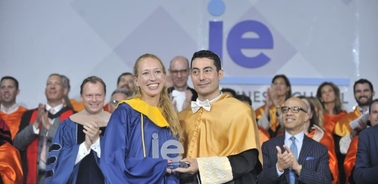- Home
- News And Events
- What’s Going On
- Women Lead The Top Graduate Chart For The Imba July 2019 Graduation
Women lead the top graduate chart for the IMBA July 2019 graduation

Three women take top honors at the July 2019 IMBA graduation, pointing to a trend toward gender balance in the classroom.
For the first time ever, the three top graduates of IE Business School’s International MBA program were women. Krystyna Liakh, Yuki Micha Djaja and Mirte Van Loenen placed in the top three slots of the July 2019 IMBA graduation, pointing toward a gender parity trend that is making IE more attractive to women talent.
“As an educational institution, we need to have top women talent in the class room, to understand women’s interest and in turn provide the market with the best possible talent,” said the Director of the IE Women’s Initiative, Celia de Anca. “The fact that three of them are among the top graduates, means that the quality of students improves the quality of our programs and in turn improves the quality of the market.”
The three student leaders agreed that IE’s diversity drew them to Madrid.
“One of the best things at IE for me was how open, welcoming and supportive the class environment was throughout the program,” said Liakh, who will stay in Madrid after graduation to pursue an internship at European mid-market private equity fund Bridgepoint. “Our cohort was so diverse, by nationality, background, culture that for me personally, gender was at no point a discriminating factor.”
But they also said there is room to improve.
“On graduation day, it was interesting to see that most of the parents in the IMBA program are men,” said Djaja, who is currently interviewing with a digital health company in Toronto. “Although I did not personally experience this as I am not a mom, I could empathize how being a mom and having a family could perhaps be one of the biggest deterrents for women to completing their MBA.”
Currently, enrolment for female students in the International MBA is 33%, but the Business School has set its sights on 40% female students in the program by 2021.
“It is precisely because women have different experiences and backgrounds that enables them to have a different approach to business and it is challenging ideas with people who think differently that breeds the creativity necessary to push organizations forward,” said Associate Director of Admissions, Patricia Bonilla.
“As a leader in higher education, we have a paramount role to play in reaching gender equality.”
To that end, the MBA team has already put some key initiatives in place to appeal to women prospective students, including the Women4Women ambassador program to support female applicants during the application process, women scholarships, the very active Women in Business Club, IE’s Women’s Initiative, specific online sessions for women—and IMBA Associate Dean Jose Esteves’ newly-launched Digital Female Leadership mentorship program for students interested in a career in tech companies.
Indeed, according to De Anca, IE has learned from current students—including the top three IMBA graduates—what women applicants seek. More importantly, De Anca said it is crucial the university take responsibility for changing the market and adding women to the classroom, which will ultimately translate to more women in top positions and, ultimately, changing society.
In fact, Van Loenen, one of the top graduates, worked specifically on how to increase the intake of women in the MBA program as her Final Project and found tracking data and targeting appropriate communication to women paramount to success.
“I think society is asking for it,” said Van Loenen, whose degree was sponsored by her previously existing consulting job at Boston Consulting Group in Amsterdam. “If you want a diverse cohort, 40% is a good balance and from 30% to 40% is not so many extra students.”
But IE’s commitment to bolstering women in the classroom is more than just a market savvy decision, said Concepcion Galdon, who heads the Social Innovation Initiative. It is a question of IE’s commitment to the UN’s Global Compact and its Sustainable Development Goals (SDGs) as a framework to advance the institution’s contribution to the world’s most pressing challenges.
“As a leader in higher education, we have a paramount role to play in reaching gender equality,” Galdon explained.
For Galdon, it is a win-win scenario.
“As a talent based organization, not being able to tap into 100% of the world’s talent complicates our efforts to remain ahead of the trends. We want women to have equal opportunities because it’s fair and we need women to have equal opportunities because they will contribute to our excellence.”


